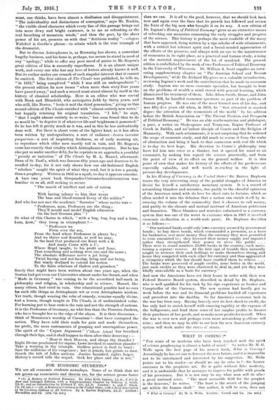FOR ECONOMIC STUDENTS.*
WE are all economic students nowadays. Some of us think that we are grown-up economists and therein err, for the science grows faster - — ••(1) A History of Political Economy. By John Hells Ingram, LL.D., F.T.C.D. New and Enlarged Edition, with a Supplementary Chapter by William A. Scott, LL.D., and an Introduction by Richard T. Ely, LL.D. London : A. and C. Black. I is. Cd. net.)—(2) A History of Currency in the United States, with a Brief Description of the Currency Systems of All Nations. By A. Barton Hepburn, LL.D. London : kfacmglan and Co. (lOs. ed. net.) than we can. It is all to the good, however, that we should look back now and again over the lines that its growth has followed and review the feats of the big men yam brought it on its way. A new edition of Dr. Ingram's History of Political Economy' gives us an attractive means of refreshing our memories concerning the early struggles and progress of the science. This history is perhaps the most readable of the many that have appeared, being written by a ripe scholar of wide attainments, with a critical but tolerant spirit and a broad-minded appreciation of the efforts of the pioneers, and always with an eye to the maintenance of economics in its right place, as a practical and human study, a:ming at the material improvement of the lot of mankind. The present edition is embellished by the work of two Professors of Political Economy in the University of Wisconsin. Dr. William A. Scott supplies an inter- esting supplementary chapter on " The Austrian School and Recent Developments," while Dr. Richard Ely gives us a valuable introduction, reviewing Ingram's work and the contribution that he made to economic, study. Ingram was no mere economic specialist, but brought to bear on the problems of wealth a mind stored with general learning, which illuminated his treatment of them. Like Adam Smith, Hume, and John Stuart Mill, he handled economic questions as part of the problem of human progress. He was one of the most learned men of his day, and was fifty-five years old when, in 1878, he " first attracted in marked degree the attention of the economists of the world " by his address before the British Association on " The Present Position and Prospects of Political Economy." He was an able mathematician and philologist, a poet, a writer on Shakespeare and Tennyson, Regius Professor of Greek in Dublin, and aeanlent disciple of Comte and (ho Religion of Humanity. With such attainments, it is not surprising that ho widened the scope of economic study, and did much to rescue it from the realm of abstraction and bring it back to that connexion with real life which is to-day its best hope. His devotion to Comte's philosophy may have led him into error as a thinker, but it opened his mind as an economist, by making him regard the science practically, and from the point of view of its effect on the general welfare It is this point of view that makes his history of the efforts of his predecessors especially valuable, and well worth re-reading in the light of present-day developments.
In his History of Currency in the United Stake= Dr. Barton Hepburn traces the very interesting story of the painful struggles of America to devise for herself a satisfactory monetary system It is a record of astonishing blunders and mistakes, duo partly to the cheerful optimism of the American mind, with its love for short cuts to fortune, which so often misled it into the delusion that a nation can enrich itself by in- creasing the volume of the commodity that it chooses to call money, and partly to the chronic and mutual mistrust of American politicians and financiers. These blunders and mistakes culminated in a currency system that was one of the worst in existence when in 1907 it involved economic civilization in a world-wide panic. Dr. Hepburn describes it as follows :-
" Our national banks could only issue currency secured by government bonds ; to buy these bonds, which commanded a premium, as a basis for banknotes, cost more money than the currency they were permitted to issue amounted to ; they lessened their money supply and impaired rather than strengthened their power to servo the public . . . There were in round numbers 25,000 banks in the country, each main- taining a separate reserve. At the first sign of trouble they naturally sought to increase their cash holdings to make themselves strong, and hence they competed with each other for currency and thus aggravated a stringency which the law should have enabled them to relieve. . . . The banks were possessed of ample credits, none better in the world, just such credits as they were chartered to deal in, and yet they were wholly unavailable as a basis for currency."
And now the Americans have set their house in order with their new Federal Reserve Board system, described in detail by Dr. Hepburn, who is well qualified for his task by his ripe experience as banker and Comptroller of the Currency. The new system had hardly got to work before the war and its financial problems hustled all experience and precedent into the dustbin. So far America's economic task in the war has been easy. Having bravely met its first shock to credit, she has only bad to enrich herself with amazing rapidity at the expense of the belligerents, and lend them some of her surplus profits to finance their purchases of her goods, and so make more profits for herself. When the war is over new and perhaps even more astonishing p.ublems will arise ; and then we may be able to see how the new American currency system will work under the stress strain.






























 Previous page
Previous page